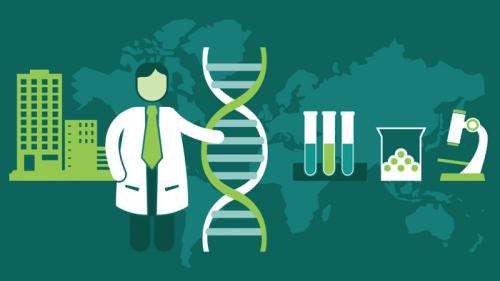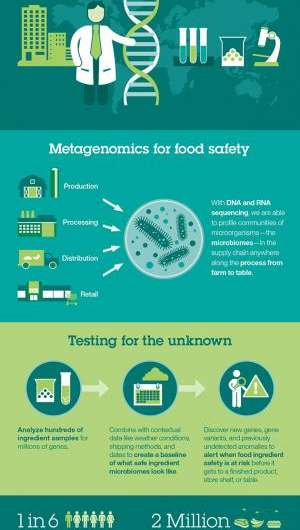January 30, 2015 report
IBM and Mars join together to make food safer with genetics

(Phys.org)—Computer giant IBM, and food giant Mars, have announced a joint project they are calling "Consortium for Sequencing the Food Supply Chain." The idea is to use modern microbiology, computer crunching and analysis techniques to identify all of the things that are in our food, both good and bad, to ultimately make the food we buy and eat safer.
As they note in their announcement, our food is not as safe as we would like, every year billions of dollars goes into treating the thousands of people who get sick due to food borne illnesses, some of whom die. The problem, they also note, is only going to get worse as the population rises, meaning more mouths to feed. IBM and Mars believe the way to make food safer, is to identify all of the things that are in the food we eat, so that tools can be developed to recognize when something is in them that is not supposed to be there.
To achieve this goal, the two companies have embarked together on a two year journey which will start with studying genetic markers of viruses, bacteria, fungi, etc. and the ways they get into and interact with foods and eventually progress to sequencing the genomes of all the foods we eat that have some degree of organic matter from plant or animal ingredients. Mars will supply a continuous stream of samples from its food factories to IBM which will test the samples in collaboration with genomics experts. Data will be sent to IBM's massive 500 node Accelerated Discovery THINKLab for sequencing and for populating databases which will be developed to sort out the intricacies of material under examination and to provide a standard for comparing samples against in the future. Eventually, the two would like to expand the scope of the work to include every possible element in the food chain, from bacteria in soil, to bacteria found on forks in a silverware drawer. The idea is to build a baseline for everything we eat, and then to create a means for testing food against that baseline to see if it conforms, if not, it probably has something in it that should not be there, and that might be harmful.

Food companies have extensive testing programs in place, but they only test for what they expect to find. This new approach will allow for testing for unknown threats, such as weapoized bacteria, or toxins inadvertently introduced by accident. The ultimate goal of this project is to develop an inexpensive way to test food which should be lucrative for IBM, helpful for Mars, and safer for consumers.
More information: Press release: www.mars.com/global/press-cent … px?SiteId=94&Id=6369
© 2015 Phys.org

















